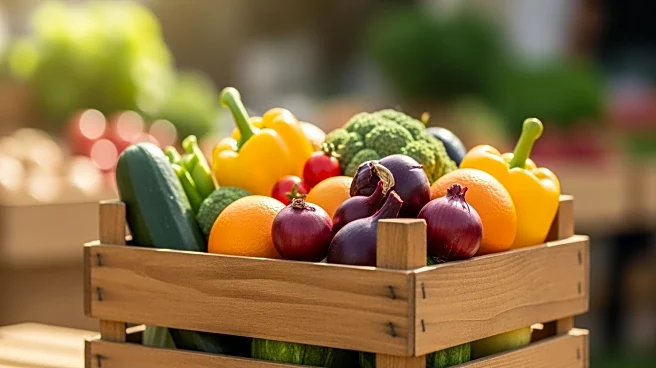What's Happening?
Whole Foods Market has expanded its 'Surprise Bag' offerings of surplus food through the Too Good To Go app, adding seven new categories. These categories include produce, seafood, meat, dry goods, frozen
foods, refrigerated foods, and floral items, available at over 530 Whole Foods stores across the U.S. The initiative, which began in July 2024 with bakery and prepared food bags, aims to reduce food waste by offering surplus items at approximately one-third of their retail price. Caitlin Leibert, VP of Sustainability at Whole Foods, emphasized the importance of reducing food waste as part of the company's mission to nourish people and the planet.
Why It's Important?
The expansion of Whole Foods' 'Surprise Bag' initiative represents a significant step in addressing food waste, a major issue in the U.S. food industry. By offering surplus food at reduced prices, Whole Foods is not only helping to minimize waste but also providing consumers with affordable options. This initiative aligns with broader sustainability goals and could influence other retailers to adopt similar practices, potentially leading to industry-wide changes in how surplus food is managed. Additionally, it offers economic benefits to consumers, particularly those seeking cost-effective ways to purchase high-quality food.
What's Next?
As Whole Foods continues to expand its 'Surprise Bag' offerings, other retailers may be encouraged to implement similar programs, potentially leading to a reduction in food waste across the industry. This could result in increased collaboration between retailers and sustainability-focused organizations, further promoting eco-friendly practices. Additionally, consumer awareness and demand for sustainable options may drive further innovation in the food retail sector, influencing product offerings and marketing strategies.
Beyond the Headlines
The initiative highlights ethical considerations in the food industry, such as the importance of reducing waste and promoting sustainable consumption. By offering surplus food at reduced prices, Whole Foods is addressing both environmental and social issues, providing consumers with affordable access to quality food while minimizing waste. This approach may encourage consumers to adopt more sustainable purchasing habits, influencing long-term shifts in industry practices and consumer behavior.










